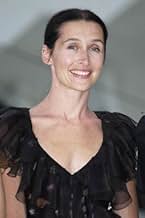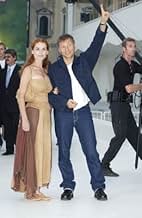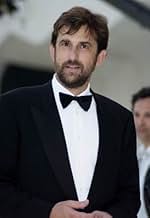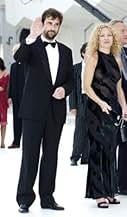IMDb रेटिंग
6.3/10
2.5 हज़ार
आपकी रेटिंग
अपनी भाषा में प्लॉट जोड़ेंA New York thief, a tough-as-nails hundred-year-old woman, two brothers from the Wild West, a Macedonian revolutionary and a beautiful pregnant woman, all cross paths in a tale that spans tw... सभी पढ़ेंA New York thief, a tough-as-nails hundred-year-old woman, two brothers from the Wild West, a Macedonian revolutionary and a beautiful pregnant woman, all cross paths in a tale that spans two continents and three centuries.A New York thief, a tough-as-nails hundred-year-old woman, two brothers from the Wild West, a Macedonian revolutionary and a beautiful pregnant woman, all cross paths in a tale that spans two continents and three centuries.
- पुरस्कार
- कुल 1 नामांकन
Joseph Mosso
- Church bell
- (as Joe Mosso)
फ़ीचर्ड समीक्षाएं
Firstly, I'm a huge David Wenham fan. Didn't read anything about the plot before renting it. I was really surprised by the film's beginning, having no cowboys or Macedonians in sight. This was an interesting Rashomon-like tale, but I really didn't care for two of the storytellers - the old lady and the burglar. I think the story would've worked better just told from the two brothers point of view; no silly subplot about gangsters and gold coins.
Joseph Fiennes is hardly in the movie, and when he is, he mostly quotes the Bible in a horrid accent. David Wenham's American accent was even worse. For me to say anything negative about Wenham...it must be really bad. He also screamed in anguish at the sky so much I could only think "Mendooooza!" (from the Simpsons' "McBain" movies). Visually, this film was very beautiful, not just because of a handsome lead either, but very engaging use of colors, costumes and landscape. The way images from the past and future collided was very cool. The gun-fight scenes were well choreographed, and pretty damn bloody. Perhaps that's why I found the old lady's section less interesting - less action, less exotic locations.
A few laughs, a few gasps, a bit of sex, a lot of violence, but just too thin of a story. If you arrange the brothers' tale minus the gimmicky time-jumps, the movie would be about an hour long, not 2+ hours. I can't figure why the director didn't just fatten the characters and context of their story and tell it straight through. This is a movie about storytelling, but viewers need a better story. And David Wenham deserves a better movie. Preferably one where he can speak more naturally.
Joseph Fiennes is hardly in the movie, and when he is, he mostly quotes the Bible in a horrid accent. David Wenham's American accent was even worse. For me to say anything negative about Wenham...it must be really bad. He also screamed in anguish at the sky so much I could only think "Mendooooza!" (from the Simpsons' "McBain" movies). Visually, this film was very beautiful, not just because of a handsome lead either, but very engaging use of colors, costumes and landscape. The way images from the past and future collided was very cool. The gun-fight scenes were well choreographed, and pretty damn bloody. Perhaps that's why I found the old lady's section less interesting - less action, less exotic locations.
A few laughs, a few gasps, a bit of sex, a lot of violence, but just too thin of a story. If you arrange the brothers' tale minus the gimmicky time-jumps, the movie would be about an hour long, not 2+ hours. I can't figure why the director didn't just fatten the characters and context of their story and tell it straight through. This is a movie about storytelling, but viewers need a better story. And David Wenham deserves a better movie. Preferably one where he can speak more naturally.
In modern New York, a thief (Adrian Lester) breaks into an old woman's apartment. She surprises him and holds him at gunpoint. She tells him the story about two brothers in the turn of the century. Elijah (Joseph Fiennes) and Luke (David Wenham) have a breakdown in relationship. Luke is drawn to the wild east in Macedonia where the Ottoman is battling a local revolt. He joins a group of bandits pursuing the revolt leader known as The Teacher for the lucrative reward. He gets taken prisoner by the Turks who is joined by his hated brother.
Filmmaker Milcho Manchevski has taken on too much for one movie. It's trying to do too much and ends up stepping on each other. It may work better as an old style violent spaghetti western. Even taken separately, the narrative flow is a bit disjointed. The modern part only adds the trans-generational story. The robbery part isn't that compelling. Without knowing either character, there is nothing to root for or against. It's often problematic to have a character tell the story of the movie. The reliability of the telling is suspect. It's also trying to have some surreal poetry about flying. It's doing too much and gets muddled. This is definitely ambitious and probably too ambitious for its own good.
Filmmaker Milcho Manchevski has taken on too much for one movie. It's trying to do too much and ends up stepping on each other. It may work better as an old style violent spaghetti western. Even taken separately, the narrative flow is a bit disjointed. The modern part only adds the trans-generational story. The robbery part isn't that compelling. Without knowing either character, there is nothing to root for or against. It's often problematic to have a character tell the story of the movie. The reliability of the telling is suspect. It's also trying to have some surreal poetry about flying. It's doing too much and gets muddled. This is definitely ambitious and probably too ambitious for its own good.
I do not understand why people try to comprehend this movie as a real-life story, because there are many "hints" telling viewers not to do so - photographs with characters from different epochs together, modern airplane flying over Macedonia at the beginning of twentieth century, etc. - even the sarcastic homage to spaghetti-western tradition ("hero" killing six or seven people with a single bullet)... In my opinion, it should be viewed as a story about human souls, their connection through time and space, about human fate, where main character, although ill-natured, was "sent by destiny" to a far-away land to do the good deed of his life (Elijah's decision to save life of Macedonian rebel's child at the end of the movie looks more like being driven by some irrational then rational force).
The movie also has its point picturing the way westerns see (and saw) Balkan area - as a confusing battleground where everyone have there objectively justifiable reasons to think they are right - making the whole picture far from "black and white". Still, the "western people" come to do their own business (collect the gold), but end up in a completely different connection with people and territory... Personally, I did not like characters of Edge and Angela, in my opinion they are built as clichés with no good reason. On the other hand, characters of two cowboys, as well as Turkish gang-soldiers and Corto Maltese (comic-book figure well known in Europe), built as stereotypes, perfectly fill the sarcastic, humorous attitude of Filmmaker on profane observance of life...
The movie also has its point picturing the way westerns see (and saw) Balkan area - as a confusing battleground where everyone have there objectively justifiable reasons to think they are right - making the whole picture far from "black and white". Still, the "western people" come to do their own business (collect the gold), but end up in a completely different connection with people and territory... Personally, I did not like characters of Edge and Angela, in my opinion they are built as clichés with no good reason. On the other hand, characters of two cowboys, as well as Turkish gang-soldiers and Corto Maltese (comic-book figure well known in Europe), built as stereotypes, perfectly fill the sarcastic, humorous attitude of Filmmaker on profane observance of life...
When we first put Dust into the DVD player and the film started, I wondered if maybe the video-rental store put the wrong dvd in the case. As the story progressed, I was enamored by the brilliant execution of story within story within story. The world needs more films like this, with semi-unfamiliar faces who don't need to work so hard convincing us that they are indeed this character they portray. This is one of those films people will still be talking about in 25 years; a monumental masterpiece that broke the grounds in straightforward plot-telling!!
Milcho Manchevski establishes new guidelines for independent movie makers, successfully balancing between Hollywood commercial and the independent art film. Only few compromises and hybrids like this have proven worth filming (and watching) and I was pleasantly surprised with the outcome.
First of all, there was the careful choice of names - Luke and Elijah (biblical names) opposed to the prostitute Lilith (female demon). No wonder that Lilith was in so many ways connected with water and finally she drowned. Than, there's Neda (from an old Macedonian poem "Serdarot" by Grigor Prlichev, awarded first prize at Athens). Then, a thing which impressed me was the short appearance of certain characters like Sigmund Freud, Pablo Picasso and Josip Broz Tito. Manchevski has used his old "trick" from his first film "Before the Rain" - non-linear time, but while in "Before the rain" the explanation was "The circle is not round, time never dies" in "Dust" it is "The centuries do not follow up each other but coexist like parallel universes".
Repentance was an important motif in the movie, especially the repentance of Luke and Edge.
Certain scenes have moved me, the scene in the hospital when Angela dies and the nurse is asking Edge what is he to her... The scene in Macedonia, when the women are laundering the carpets on a rocky waterfall (Mariovo)... And another thing - me as a Macedonian have always been brought up with the notion that our freedom fighters were noble men who were usually victims of blood thirsty Turks, but this movie had an interesting point that they were all butchers and murderers whose only lust is not freedom or fight against oppression but GOLD!
Probably this movie doesn't have the prophetic touch of "Before the rain" clearly displayed in the current political situation in Macedonia, but there's again the scene with Albanian gangs killing innocent Macedonian cattle breeders.
And another thing - both Angela and Luke are mocking the official clerical (church) "authorities", when Angela refuses the confession of the catholic priest on her death bed and when Luke kills the local orthodox priests offering assistance in the negotiations with the Turks (by the way, the priest is a traitor, which questions another illusion of mine and my generation - that the priests and the Church have been very active in protecting the Macedonian villagers from oppression and torment).
I know one thing for sure - that as soon as I am able I will use my proud privilege to be a Macedonian and visit Mariovo, where a part of the movie was made, and especially the bridge where the Turks attempted to pass so many times during the 17-th century and did not succeed.
The tension seems to fade at some points and that's why the rate of "9" form my user's vote, but still, this is an excellent complete product, made with the touch of perfect craftsmanship.
First of all, there was the careful choice of names - Luke and Elijah (biblical names) opposed to the prostitute Lilith (female demon). No wonder that Lilith was in so many ways connected with water and finally she drowned. Than, there's Neda (from an old Macedonian poem "Serdarot" by Grigor Prlichev, awarded first prize at Athens). Then, a thing which impressed me was the short appearance of certain characters like Sigmund Freud, Pablo Picasso and Josip Broz Tito. Manchevski has used his old "trick" from his first film "Before the Rain" - non-linear time, but while in "Before the rain" the explanation was "The circle is not round, time never dies" in "Dust" it is "The centuries do not follow up each other but coexist like parallel universes".
Repentance was an important motif in the movie, especially the repentance of Luke and Edge.
Certain scenes have moved me, the scene in the hospital when Angela dies and the nurse is asking Edge what is he to her... The scene in Macedonia, when the women are laundering the carpets on a rocky waterfall (Mariovo)... And another thing - me as a Macedonian have always been brought up with the notion that our freedom fighters were noble men who were usually victims of blood thirsty Turks, but this movie had an interesting point that they were all butchers and murderers whose only lust is not freedom or fight against oppression but GOLD!
Probably this movie doesn't have the prophetic touch of "Before the rain" clearly displayed in the current political situation in Macedonia, but there's again the scene with Albanian gangs killing innocent Macedonian cattle breeders.
And another thing - both Angela and Luke are mocking the official clerical (church) "authorities", when Angela refuses the confession of the catholic priest on her death bed and when Luke kills the local orthodox priests offering assistance in the negotiations with the Turks (by the way, the priest is a traitor, which questions another illusion of mine and my generation - that the priests and the Church have been very active in protecting the Macedonian villagers from oppression and torment).
I know one thing for sure - that as soon as I am able I will use my proud privilege to be a Macedonian and visit Mariovo, where a part of the movie was made, and especially the bridge where the Turks attempted to pass so many times during the 17-th century and did not succeed.
The tension seems to fade at some points and that's why the rate of "9" form my user's vote, but still, this is an excellent complete product, made with the touch of perfect craftsmanship.
क्या आपको पता है
- ट्रिवियाDust caused quite a stir when it premiered. A number of European critics viewed Manchevski's film as an extension of his recent op-ed piece in The Guardian. The op-ed asked NATO to take responsibility for a civil war in his homeland Macedonia - even though Dust was finished before the war even began.
- गूफ़The old woman Angela's (Rosemary Murphy) refrigerator dispenses the gold coins from the story, even though they were all scattered at the Turkish camp by Luke (David Wenham) when he came for Neda (Nikolina Kujaca).
टॉप पसंद
रेटिंग देने के लिए साइन-इन करें और वैयक्तिकृत सुझावों के लिए वॉचलिस्ट करें
- How long is Dust?Alexa द्वारा संचालित
विवरण
- रिलीज़ की तारीख़
- कंट्री ऑफ़ ओरिजिन
- आधिकारिक साइट
- भाषाएं
- इस रूप में भी जाना जाता है
- Cenizas y pólvora
- फ़िल्माने की जगहें
- उत्पादन कंपनियां
- IMDbPro पर और कंपनी क्रेडिट देखें
बॉक्स ऑफ़िस
- बजट
- $1,10,00,000(अनुमानित)
- दुनिया भर में सकल
- $1,08,698
- चलने की अवधि2 घंटे 7 मिनट
- रंग
- ध्वनि मिश्रण
- पक्ष अनुपात
- 1.85 : 1
इस पेज में योगदान दें
किसी बदलाव का सुझाव दें या अनुपलब्ध कॉन्टेंट जोड़ें
































